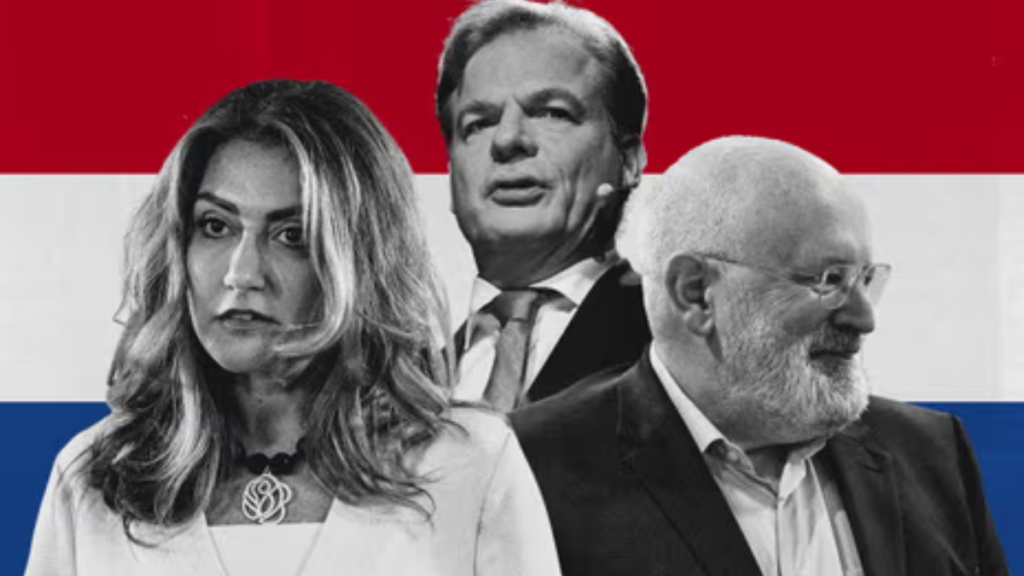Dutch voters are set to cast their ballots in a closely contested Dutch Elections on Wednesday, with Dilan Yesilgöz, the first female Dutch prime minister, leading the race. However, she faces strong competition from Geert Wilders, an anti-Islam populist, and Frans Timmermans, head of a left-alliance. Pieter Omtzigt’s New Social Contract party may play a decisive role in the formation of the next coalition government. The election is expected to be an unprecedented scenario in Dutch politics, with the winner potentially securing less than 20% of the national vote and fewer than 30 seats. The recent scandal that falsely labeled thousands of parents as welfare fraudsters has eroded trust in the government, paving the way for new contenders like Omtzigt. Dilan Yesilgöz, from Turkish refugee roots, has positioned herself as a candidate focused on building new housing and addressing migration concerns. Geert Wilders has put his anti-Islam policies on hold, allowing collaboration with other parties in government. Frans Timmermans, leading a left alliance, sees an opportunity to lead the next government.
The Race Begins
On Wednesday, Dutch voters will cast their ballots in a closely contested Dutch Elections, with polls indicating a neck-and-neck race among four prominent parties. This election marks a pivotal moment in Dutch politics, as the nation seeks a new leader after 13 years of governments under Mark Rutte.
The Front-Runners
Leading the race is Dilan Yesilgöz, the center-right leader, who stands poised to make history as the first female Dutch prime minister. However, she faces strong competition from Geert Wilders, an anti-Islam populist, and Frans Timmermans, heading a left-alliance. The dynamics of this election are further complicated by the presence of Pieter Omtzigt, whose New Social Contract party may play a decisive role in the formation of the next coalition government.
Unprecedented Political Landscape
With more than 13 million Dutch voters having the choice of 26 parties, as many as 17 parties could secure seats in the 150-seat parliament. European observers are closely monitoring this election, anticipating that the winner might secure less than 20% of the national vote and fewer than 30 seats, marking an unprecedented scenario in Dutch politics.
Trust in Government at a Low
The political landscape is further complicated by the recent political scandal that falsely labeled thousands of parents as welfare fraudsters. This scandal has eroded trust in the government, paving the way for new contenders like Pieter Omtzigt and his New Social Contract party.
Pieter Omtzigt: The Potential Kingmaker
Despite showing little interest in leading the country, Pieter Omtzigt’s New Social Contract party is likely to be central in forming the next coalition government. Omtzigt, a champion for the rights of those wrongly accused in the welfare fraud scandal, commands influence that could be pivotal in shaping the political future of the Netherlands.
Dilan Yesilgöz’s Campaign Focus
Dilan Yesilgöz, coming from Turkish refugee roots, has positioned herself as a candidate focused on building new housing and addressing migration concerns. Lowering migration levels is a key priority for her, alongside tackling the high cost of living. Unlike some rivals, she has not ruled out the possibility of working with Geert Wilders’ Freedom Party, indicating a willingness to build a broad coalition.
Geert Wilders’ Shift in Rhetoric
Geert Wilders, a prominent figure known for his anti-Islam stance, has altered his rhetoric during this election. With 25 years of parliamentary experience, Wilders has put his anti-Islam policies on hold and expressed an understanding that Dutch voters may not be ready for an exit from the EU. This flexibility has opened the possibility of collaboration with other parties in government.
Frans Timmermans: A Left Alliance
Frans Timmermans, leading a left alliance, sees an opportunity to lead the next government. He emphasizes the historical necessity of coalitions in Dutch politics, stressing the importance of partnerships in the center of the political spectrum.
Migration as a Central Issue
The surge in support for Geert Wilders and Pieter Omtzigt’s call for a migration ceiling highlights the growing concern among voters. Last year’s significant increase in net migration, partly due to the influx of refugees from Russia’s invasion of Ukraine, has intensified the debate. Even the traditionally centrist NSC, led by Omtzigt, advocates for a migration ceiling, underscoring the broad resonance of this issue.
Conclusion: A Nation at the Crossroads
As Dutch voters head to the polls, the nation stands at a crossroads, grappling with issues of trust, migration, and the need for a new political direction. The outcome of this election is uncertain, with the potential for a coalition government that reflects the diverse views of the electorate. The decisions made in the coming days will shape the future of the Netherlands and may set the course for a new political era after Dutch Elections.







